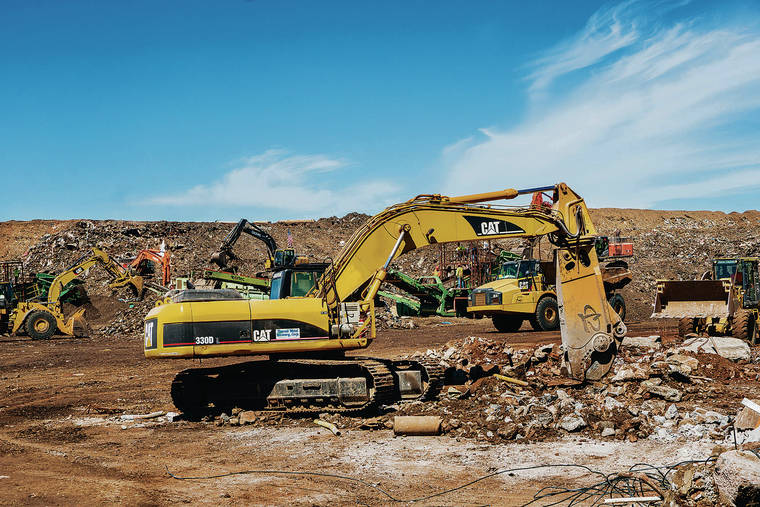Hawaii dodged Hurricane Douglas this week, but an Oahu landfill designated to receive hurricane disaster debris hasn’t dodged legislation aimed at blocking expansion of the facility.
State lawmakers recently passed a highly contested bill that would stop a planned expansion of a landfill in Nanakuli operated by PVT Land Co.
PVT runs the only landfill on Oahu permitted to accept material from commercial construction and demolition projects. The facility, which dates to the early 1980s and has an estimated five years of remaining capacity, also is designated to receive most debris from catastrophic hurricane damage.
The company claims Senate Bill 2386, which lawmakers enrolled to Gov. David Ige on July 13, will have negative consequences for ongoing or near-term construction projects including Honolulu’s rail system and redeveloping Aloha Stadium because the company will raise disposal fees and stop accepting some materials if the bill becomes law.
“Construction projects — as small as a kitchen remodel or as large as a shopping center — would come to a halt,” the company said in written testimony.
PVT also contends that if a major hurricane hit Oahu, there would be a problem with cleanup.
If a Category 4 storm struck the island, PVT anticipates receiving 4 million cubic yards of debris — representing two-thirds of everything and enough to fill Yankee Stadium five times.
“With this bill, there would be no place for the disaster debris to go for recycling and disposal,” the company said.
Other consequences from the bill would be increased illegal dumping and reduced construction material recycling, according to PVT. The company said it recycles 80% of what it receives.
SB 2386 prohibits development of new waste disposal facilities, or expansion of existing facilities needing a permit review and modification, unless they are at least a half-mile from residential, school or hospital property lines.
Such a buffer zone wouldn’t affect only PVT.
Government officials
representing the City and County of Honolulu, Maui County and Kauai County have opposed the bill on grounds that it would inhibit expansion of existing municipal landfills and waste
processing facilities.
Honolulu’s Department of Environmental Services said the bill would prevent expansion of the city’s landfill, its waste-to-energy plant, three refuse transfer stations and six refuse and recycling drop-off centers. The agency also said the bill would nullify every one of 11 sites being considered for a new city landfill on Oahu.
Kauai County testified that the bill would require closing two of four refuse transfer stations in 2022, limit the life of a metal recycling facility and create an “extremely difficult” challenge to open a new landfill or waste-handling facility to replace an existing landfill with an estimated seven years of remaining use.
Maui County anticipates having to spend millions of dollars to acquire land so that it can expand landfill facilities.
Other opponents of the bill included construction industry organizations.
Much of the testimony supporting the bill was directed at PVT, which has rankled residential neighbors for decades.
“I argue, the current regulations and policies that allow PVT to operate and relocate a landfill in the heart of Nanakuli and Maili communities are racist towards Native Hawaiians and prejudiced towards working families with low to medium incomes,” Maili resident Kamuela Werner said in written testimony. “Today, we can take a step towards environmental justice for all communities.”
Others testifying in support of the bill included other area residents, several Hawaiian civic clubs, the state Office of Hawaiian Affairs, the Sierra Club of Hawaii and nine organized labor organizations, including the Hawaii State Teachers Association, United Public Workers, Unite Here Local 5 and International Longshore and Warehouse Union.
Some testimony urging passage of the bill alleges that PVT has been the source of health problems for nearby residents.
PVT’s existing operation maintains a 750-foot buffer from the nearest homes, and the company proposes the same distance for an expansion site nearby.
Existing city rules contain a 1,500-foot buffer requirement that can be reduced to as little as 500 feet if potential negative impacts are mitigated.
A half-mile is 2,640 feet.
PVT claims its 750-foot buffer is the largest for any landfill in the state and that state Department of Health landfill regulations do a proper job protecting the public.
Dust does blow from the PVT site toward homes,
but the company has said it mitigates this and has shown through nine human health risk studies submitted to the state Health
Department over the past
15 years that dust from its operations doesn’t pose
a health concern for its workers or nearby populations.
State senators unanimously passed the bill in early March, but the measure had a three-month pause between committee hearings in the House because of the coronavirus pandemic.
The full House passed an amended version of the bill July 6 with a 45-6 vote, followed by a 24-1 vote in the Senate on July 10.
Stephen Joseph, PVT operations vice president, said the company is disappointed that the bill passed.
“The impacts are going to be far-reaching,” he said.
PVT President Albert Shigemura said company representatives are reaching out to Ige administration officials so that the governor is aware of concerns held by PVT and counties.
Ige has yet to act on the bill. He has until Sept. 15 to veto bills but would have to notify lawmakers of such intent by Aug. 31.

